23 dec 2019
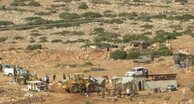
According to the Palestinian News and Info Agency (WAFA), Israeli forces,, dismantled Palestinian residential and livestock structures in the Ras al-Ahmar area, on Monday.
The owner of the demolished structures, located south of Tubas, in the northern Jordan Valley, was identified as Saed Abu Zahir.
Abdullah Bisharat, head of Atouf and Ras al-Ahmar Village Council, stated that Israeli forces invaded Ras al-Ahmar, and proceeded to dismantle shacks and a barn, under the pretext of being built without a license.
Also of note was the fact that Israeli forces held researcher Aref Daraghmeh, 50, who was documenting the demolition, for at least an hour
and seized his vehicle, with the intent to intimidate him.
Destroying the property and livelihood of the Palestinians is in effect a means of forcible transfer. Article 49 of the Fourth Geneva Convention states; the occupying power is prohibited from forcibly displacing the inhabitants of the land it occupies.
The owner of the demolished structures, located south of Tubas, in the northern Jordan Valley, was identified as Saed Abu Zahir.
Abdullah Bisharat, head of Atouf and Ras al-Ahmar Village Council, stated that Israeli forces invaded Ras al-Ahmar, and proceeded to dismantle shacks and a barn, under the pretext of being built without a license.
Also of note was the fact that Israeli forces held researcher Aref Daraghmeh, 50, who was documenting the demolition, for at least an hour
and seized his vehicle, with the intent to intimidate him.
Destroying the property and livelihood of the Palestinians is in effect a means of forcible transfer. Article 49 of the Fourth Geneva Convention states; the occupying power is prohibited from forcibly displacing the inhabitants of the land it occupies.
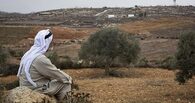
Israeli forces, on Monday, seized a number of tents and uprooted trees in the area of Khirbet Tana, a small village located east of Nablus city, the Palestinian News and Info Agency (WAFA) reported.
Ghassan Daghlas, who monitors settlement activities in northern West Bank, said that Israeli troops invaded the area and declared it a ‘closed military zone’ before proceeding to seize the tents and uproots trees.
The Palestinian village has been demolished multiple times by the Israeli authorities, as the Israeli Civil Administration does not recognize it as a village worth planning, therefore prohibits construction there.
A community of some 250 Palestinians relying on animal husbandry and agriculture for their livelihood, Khirbet Tana has been left with essentially no infrastructure, they are not connected to a water source or electricity, relying on natural springs.
According to the United Nations monitoring group Office for the Coordination of Humanitarian Affairs (OCHA), recent Israeli demolitions in the village “displaced ten families with 36 members, including 11 children, and affected the livelihoods of five additional families.”
The “Civil Administration” is the name Israel gives to the body administering its military occupation of the West Bank. This authority determines where Palestinians may live, where and when they may travel, and whether or not they can build or expand on their own land.
Ghassan Daghlas, who monitors settlement activities in northern West Bank, said that Israeli troops invaded the area and declared it a ‘closed military zone’ before proceeding to seize the tents and uproots trees.
The Palestinian village has been demolished multiple times by the Israeli authorities, as the Israeli Civil Administration does not recognize it as a village worth planning, therefore prohibits construction there.
A community of some 250 Palestinians relying on animal husbandry and agriculture for their livelihood, Khirbet Tana has been left with essentially no infrastructure, they are not connected to a water source or electricity, relying on natural springs.
According to the United Nations monitoring group Office for the Coordination of Humanitarian Affairs (OCHA), recent Israeli demolitions in the village “displaced ten families with 36 members, including 11 children, and affected the livelihoods of five additional families.”
The “Civil Administration” is the name Israel gives to the body administering its military occupation of the West Bank. This authority determines where Palestinians may live, where and when they may travel, and whether or not they can build or expand on their own land.
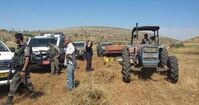
The Israeli occupation forces (IOF) on Sunday evening stormed Ein al-Baida village in the northern Jordan Valley and confiscated a forklift truck belonging to a local resident.
Local official Aref Daraghmeh said that Israeli soldiers checked the ID cards of some villagers and seized a forklift truck belonging to Yousef Faqha, with no reason.
The IOF carries out repeated raids on villages and hamlets in the northern Jordan Valley, brutalize local residents, appropriate or destroy their property and prevent them from using their own lands for construction or agricultural purposes.
Local official Aref Daraghmeh said that Israeli soldiers checked the ID cards of some villagers and seized a forklift truck belonging to Yousef Faqha, with no reason.
The IOF carries out repeated raids on villages and hamlets in the northern Jordan Valley, brutalize local residents, appropriate or destroy their property and prevent them from using their own lands for construction or agricultural purposes.
21 dec 2019
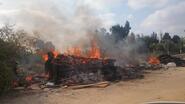
Garbage collectors prefer to discharge their loads at unauthorized dumping grounds to avoid prices charged at official sites, leaving entire neighborhoods choking on smoke and understaffed authorities struggling to enforce the law
Illegal garbage burning has destroyed the quality of life for residents in the city of Rosh Ha'ayin, with locals unable to even open a window or breathe in fresh air.
The smell of smoke is ever-present in the air around the neighborhood, emanating from an illegal dumping ground for domestic waste in the nearby city of Kafr Qasim.
For the past 18 months, the Rosh Ha'ayin residents have become prisoners in their own homes, trying to dodge the fumes.
"We thought we were moving out of the city to the fresh air and a better quality of life," said Emmanuel, a father of three who recently moved from a suburb of Tel Aviv.
"But we found the exact opposite and see our kids chocking on the smoke."
Hundreds of thousands of Israelis are suffering from the same hazardous pollution in a growing number of communities, mostly in the eastern areas of the country, putting their health in immediate danger and adversely affecting their quality of life.
A report issued by the Knesset Research and Information Office earlier this year warned that burning domestic garbage in illegal sites is harmful to the health of hundreds of thousands of Israelis.
The 47-page report outlining the dangers and concerns of illegal garbage burning sites has been submitted to the subcommittee on air pollution, but until a new Knesset is sworn in after the March 2020 elections, there is no expectation that anyone will take up the matter.
Garbage collectors prefer to discharge their loads at illegal dumping grounds because they can avoid paying the higher charges at official sites.
The amount of garbage produced by Israelis each year has been on the rise and only 20% of it is recycled.
Most of the garbage is dumped in open areas and burned in illegal sites run by criminal elements, who are raking in millions of shekels from this lucrative business.
People subjected to the smoke and smell report burning sensations in their eyes and noses, trouble breathing, headaches and even vomiting.
The long-range effects of exposure to the toxins released into the air by these fires can trigger asthma and bronchitis and could eventually cause cancer, heart disease and a host of other ailments.
Cat and mouse game
Gabai, a 41-year-old married father of two also moved into the neighborhood recently, only to discover the choking smoke that keeps them inside the house.
"We are not used to this," he said. "The smell of burning plastic and chemicals makes it impossible for us to step out onto our balcony."
Gabai said he contacted the authorities and did everything a concerned citizen could but nothing has helped.
"Officials at the Ministry of Environmental Protection came here to see for themselves," Emanuel said. "They confiscated a garbage truck. They are trying to help but it is a cat and mouse game and by the time the authorities arrive at the site, the criminals are long gone."
Rosh Ha'ayin's city helpline alone has recorded 180 calls since the beginning of 2019.
The Knesset report estimates a quarter of a billion tons of waste are burned annually and the Ministry of Environmental Protection says there are 300 illegal dumping and burning sites around the country.
The problem is compounded by a lack of funds needed to enforce the law, the report states.
There are only a small number of dedicated police officers responsible for a growing area and the Israel Police told the authors of the report that the volume of cases they must prosecute is immense and the department lacks not only manpower but also the technological tools to carry out their duties.
"This is a failure of the government that must be corrected," says Blue & White MK Yael German, a former health minister who headed the Knesset subcommittee on air pollution.
"Allegedly, crime cartels are in charge and are not easily pushed out," she says, adding that local councils and municipalities are making it difficult for legitimate companies to compete for the garbage collection tenders because of costs.
German's committee was considering different solutions, including black-listing service providers who bypass the law and opt for illegal dumping.
Since the government has been unable to enforce the law, it is forced to bear the financial burden of putting out the fires.
Local governments on their part often avoid the costs of cleaning up the sites making them attractive to repeat offenders.
"This government has left Israelis and their health by the roadside," says Yaniv Bleicher who chairs the Citizens for Clean Air organization, a non-profit advocacy group.
"The Knesset report should shake the country to the core," he says, adding that in addition to health concerns, the estimated cost to the economy of these illegal dumping sites is close to NIS 1 billion annually.
Illegal garbage burning has destroyed the quality of life for residents in the city of Rosh Ha'ayin, with locals unable to even open a window or breathe in fresh air.
The smell of smoke is ever-present in the air around the neighborhood, emanating from an illegal dumping ground for domestic waste in the nearby city of Kafr Qasim.
For the past 18 months, the Rosh Ha'ayin residents have become prisoners in their own homes, trying to dodge the fumes.
"We thought we were moving out of the city to the fresh air and a better quality of life," said Emmanuel, a father of three who recently moved from a suburb of Tel Aviv.
"But we found the exact opposite and see our kids chocking on the smoke."
Hundreds of thousands of Israelis are suffering from the same hazardous pollution in a growing number of communities, mostly in the eastern areas of the country, putting their health in immediate danger and adversely affecting their quality of life.
A report issued by the Knesset Research and Information Office earlier this year warned that burning domestic garbage in illegal sites is harmful to the health of hundreds of thousands of Israelis.
The 47-page report outlining the dangers and concerns of illegal garbage burning sites has been submitted to the subcommittee on air pollution, but until a new Knesset is sworn in after the March 2020 elections, there is no expectation that anyone will take up the matter.
Garbage collectors prefer to discharge their loads at illegal dumping grounds because they can avoid paying the higher charges at official sites.
The amount of garbage produced by Israelis each year has been on the rise and only 20% of it is recycled.
Most of the garbage is dumped in open areas and burned in illegal sites run by criminal elements, who are raking in millions of shekels from this lucrative business.
People subjected to the smoke and smell report burning sensations in their eyes and noses, trouble breathing, headaches and even vomiting.
The long-range effects of exposure to the toxins released into the air by these fires can trigger asthma and bronchitis and could eventually cause cancer, heart disease and a host of other ailments.
Cat and mouse game
Gabai, a 41-year-old married father of two also moved into the neighborhood recently, only to discover the choking smoke that keeps them inside the house.
"We are not used to this," he said. "The smell of burning plastic and chemicals makes it impossible for us to step out onto our balcony."
Gabai said he contacted the authorities and did everything a concerned citizen could but nothing has helped.
"Officials at the Ministry of Environmental Protection came here to see for themselves," Emanuel said. "They confiscated a garbage truck. They are trying to help but it is a cat and mouse game and by the time the authorities arrive at the site, the criminals are long gone."
Rosh Ha'ayin's city helpline alone has recorded 180 calls since the beginning of 2019.
The Knesset report estimates a quarter of a billion tons of waste are burned annually and the Ministry of Environmental Protection says there are 300 illegal dumping and burning sites around the country.
The problem is compounded by a lack of funds needed to enforce the law, the report states.
There are only a small number of dedicated police officers responsible for a growing area and the Israel Police told the authors of the report that the volume of cases they must prosecute is immense and the department lacks not only manpower but also the technological tools to carry out their duties.
"This is a failure of the government that must be corrected," says Blue & White MK Yael German, a former health minister who headed the Knesset subcommittee on air pollution.
"Allegedly, crime cartels are in charge and are not easily pushed out," she says, adding that local councils and municipalities are making it difficult for legitimate companies to compete for the garbage collection tenders because of costs.
German's committee was considering different solutions, including black-listing service providers who bypass the law and opt for illegal dumping.
Since the government has been unable to enforce the law, it is forced to bear the financial burden of putting out the fires.
Local governments on their part often avoid the costs of cleaning up the sites making them attractive to repeat offenders.
"This government has left Israelis and their health by the roadside," says Yaniv Bleicher who chairs the Citizens for Clean Air organization, a non-profit advocacy group.
"The Knesset report should shake the country to the core," he says, adding that in addition to health concerns, the estimated cost to the economy of these illegal dumping sites is close to NIS 1 billion annually.

Israeli soldiers, today, forced a number of farmers to leave their land, in the southern West Bank village of Kisan, and threatened to arrest them if they did not, according to Kisan deputy head of village council, Ahmad Ghazal.
Ghazal told WAFA that soldiers raided the village and prevented the farmers from plowing their land, ordering them to leave it.
The farmers were ordered to get a permit from Israeli security, at the nearby Gush Etzion settlement bloc, to the south of Bethlehem, if they are to return their land.
The land in question is around 100 dunams in size, and the owners have been working and planting there for years. They also possess deeds proving ownership of the land.
Ghazal told WAFA that soldiers raided the village and prevented the farmers from plowing their land, ordering them to leave it.
The farmers were ordered to get a permit from Israeli security, at the nearby Gush Etzion settlement bloc, to the south of Bethlehem, if they are to return their land.
The land in question is around 100 dunams in size, and the owners have been working and planting there for years. They also possess deeds proving ownership of the land.
20 dec 2019
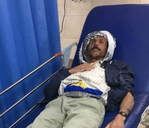
Many fanatic Israeli colonists, illegally squatting on Palestinian lands, attacked a Shepherd from Kisan village, east of the West Bank city of Bethlehem, and unleashed their dogs at him, causing various injuries.
Ahmad Ghazal, the deputy mayor of Kisan Village Council, said the colonists came from the illegal Ibei Hanahal outpost, which was installed on stolen Palestinian lands, near the illegal Maali Amos colony.
He added that the assailants attacked the farmer, Atallah Ibrahim Obeyyat, 53, causing many cuts and bruises, before unleashing their dogs toward him.
The dogs also attacked and bit some of his sheep.
The wounded farmer was transferred to Beit Jala Governmental hospital for treatment; he said the attack took place when the colonists invaded the Palestinian lands and started trying to force him out of the grazing lands.
Ghazal stated that the attack is one of the numerous violations against farmers and shepherds in the area, and is part of the ongoing Israeli attempts to force the Palestinians out in order to build and expand the illegal colonies, built in direct violation of the Fourth Geneva Convention, International Law and various United Nations resolutions, and treaties.
Ahmad Ghazal, the deputy mayor of Kisan Village Council, said the colonists came from the illegal Ibei Hanahal outpost, which was installed on stolen Palestinian lands, near the illegal Maali Amos colony.
He added that the assailants attacked the farmer, Atallah Ibrahim Obeyyat, 53, causing many cuts and bruises, before unleashing their dogs toward him.
The dogs also attacked and bit some of his sheep.
The wounded farmer was transferred to Beit Jala Governmental hospital for treatment; he said the attack took place when the colonists invaded the Palestinian lands and started trying to force him out of the grazing lands.
Ghazal stated that the attack is one of the numerous violations against farmers and shepherds in the area, and is part of the ongoing Israeli attempts to force the Palestinians out in order to build and expand the illegal colonies, built in direct violation of the Fourth Geneva Convention, International Law and various United Nations resolutions, and treaties.
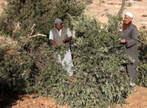
Israeli settlers, on Thursday, uprooted hundreds of olive trees in the southern West Bank town of al-Khader, near Bethlehem, the Palestinian News and Info Agency (WAFA).
Owner of the trees, Hisham Barmil said that settlers from the illegal Sidi Boaz settlement outpost built on expropriated al-Khader land, uprooted 300 olive trees and stole them.
He said the settlers invaded his 30 dunam plot of land and uprooted the trees, adding that the settlers did the same thing two months ago.
He said the settlers do not want him to develop his land, in the hope they will take it over to expand their settlement.
Owner of the trees, Hisham Barmil said that settlers from the illegal Sidi Boaz settlement outpost built on expropriated al-Khader land, uprooted 300 olive trees and stole them.
He said the settlers invaded his 30 dunam plot of land and uprooted the trees, adding that the settlers did the same thing two months ago.
He said the settlers do not want him to develop his land, in the hope they will take it over to expand their settlement.
19 dec 2019
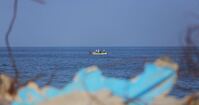
The Israeli occupation army on Thursday morning announced the reduction of the fishing area off the coast of the besieged Gaza Strip.
According to the fishermen’s union, the Israeli army told the Palestinian liaison office that the fishing zone from the north to Gaza port would be up to six nautical miles and from Gaza port to the southern border in Rafah would be up to 10 nautical miles.
The Israeli army had recently expanded anew the fishing zone in Gaza waters to 10 nautical miles as part of mediated understandings over Gaza between the Palestinian resistance and the Israeli government.
According to the fishermen’s union, the Israeli army told the Palestinian liaison office that the fishing zone from the north to Gaza port would be up to six nautical miles and from Gaza port to the southern border in Rafah would be up to 10 nautical miles.
The Israeli army had recently expanded anew the fishing zone in Gaza waters to 10 nautical miles as part of mediated understandings over Gaza between the Palestinian resistance and the Israeli government.
18 dec 2019

sraeli settlers, on Tuesday, vandalized a bulldozer and other equipment that are used to work on rehabilitating and paving roads in the Jordan Valley, in the occupied West Bank, said the owner of the equipment, Salah Zayed.
The Palestinian News and Info Agency (WAFA) reported that settlers, for the second time, have sabotaged his equipment by filling the fuel tank and engine with sand and cutting the electric wires, making the bulldozer and other equipment inoperative.
He also stated that he filed a complaint with the Palestinian liaison office in this regard.
The Palestinian News and Info Agency (WAFA) reported that settlers, for the second time, have sabotaged his equipment by filling the fuel tank and engine with sand and cutting the electric wires, making the bulldozer and other equipment inoperative.
He also stated that he filed a complaint with the Palestinian liaison office in this regard.

The Israeli occupation forces (IOF) on Wednesday morning prevented Palestinian farmers from working their lands in the northern Jordan Valley.
According to local sources, the IOF stormed Umm al-Jammal area in the northern Jordan Valley and barred local farmers from continuing to plow and cultivate their lands and threatened to confiscate any tractor seen in the area.
The IOF also prevented last night local farmers in al-Shaq area in the Jordan Valley from working their lands and seized a tractor.
According to local sources, the IOF stormed Umm al-Jammal area in the northern Jordan Valley and barred local farmers from continuing to plow and cultivate their lands and threatened to confiscate any tractor seen in the area.
The IOF also prevented last night local farmers in al-Shaq area in the Jordan Valley from working their lands and seized a tractor.
Page: 51 - 50 - 49 - 48 - 47 - 46 - 45 - 44 - 43 - 42 - 41 - 40 - 39 - 38 - 37 - 36 - 35 - 34 - 33 - 32 - 31 - 30
